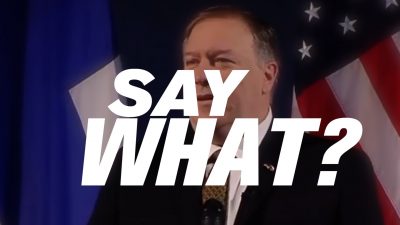A Spanish Court Calls: Mike Pompeo, We Want You

All Global Research articles can be read in 51 languages by activating the “Translate Website” drop down menu on the top banner of our home page (Desktop version).
To receive Global Research’s Daily Newsletter (selected articles), click here.
Visit and follow us on Instagram, Twitter and Facebook. Feel free to repost and share widely Global Research articles.
***
On June 3, Judge Santiago Pedraz of Spain’s national court, the Audienca Nacional, issued a summons for former CIA director and US Secretary of State Mike Pompeo to testify in an ongoing investigation into the conduct of private security firm UC Global and its founder, David Morales.
The security firm is said to have been hired by US intelligence operatives to monitor Julian Assange and his associates during his time in the Ecuadorian embassy in London. In all likelihood, if we are to take the evidence of UC Global’s former head of operations, Michel Wallemacq, seriously, Ecuador’s intelligence services were also involved.
The allegations were given a very dramatic airing in the initial extradition trial of Assange at the Old Bailey in London, when two former UC Global employees were called to testify for the defence. One of the two gave testimony on the rather seedy task of pilfering “a nappy of a baby which according to the company’s security personnel deployed at the embassy, regularly visited Mr Assange”.
The witness also revealed that Assange’s seemingly interminable stay had, by December 2017, caused nerves to fray. The “Americans … had even suggested that more extreme measures should be deployed against the ‘guest’ to put an end to the situation”. This might involve staging an “accident” that “would allow persons to enter from outside the embassy and kidnap the asylee”.
The move against Pompeo comes as part of a petition filed by Aitor Martínez, one of the lawyers representing Assange in the proceedings against UC Global. In addition to summoning Pompeo, Judge Pedraz is also seeking to question William Evanina, a former US counterintelligence official who is said to have confessed to viewing security camera footage and audio recordings from inside the Ecuadorian Embassy.
Pompeo has had a rather fickle relationship with WikiLeaks, an addling mixture of opportunistic appreciation and loathing. As House Representative from Kansas, he drew much upon the organisation’s published emails as evidence of the DNC’s rigging proclivities in selecting candidates for the 2016 election. “Need further proof that the fix was from Pres. Obama on down? BUSTED: 19,252 Emails from DNC Leaked by WikiLeaks,” tweeted Pompeo in July 2016.
When questioned about the tweet during his confirmation hearings for the post of CIA Director, selective amnesia gripped. Asked by Maine Senator Angus King whether he felt that WikiLeaks was “a reliable source of information”, Pompeo replied in the negative, adding that he had “never believed” the publishing entity to be “a credible source of information”. He had a “deep understanding of WikiLeaks” (evidence of that knowledge was not forthcoming) and had never seen it as having credible information “for the United States or for anyone else.”
Instead of making an issue of this, Senator King felt less than combative, appreciating the “candour” shown by Pompeo, with a recommendation that he “speak truth to the highest level of power in this country”. King merely hoped “that you will hold onto the commitment that you made today, because it’s not going to be easy.”
On becoming director, WikiLeaks became an object of mania for Pompeo, suggesting that his views on the outfit’s credibility had been rather short on candour. Their publishing feats, in other words, were simply too credible. The disruptive role played by the publishing organisation in the 2016 election through publishing leaked emails from Hillary Clinton’s campaign was filed away to gather dust. “It’s time to call out WikiLeaks for what it really is,” he told an audience at the Center for Strategic and international Studies (CSIS) on April 13, 2017, “a non-state hostile intelligence service often abetted by state actors like Russia.”
This was aided, in no small part, by the release by WikiLeaks of the CIA’s own crown jewels – or at the very least a good smattering of them. The publication of the Vault 7 files, detailing hacking tools developed by the intelligence organisation, unleashed a storm within the organisation. “This extraordinary collection, which amounts to more than several hundred million lines of code,” WikiLeaks declared in a press release, “gives its possessor the entire hacking capacity of the CIA.”
According to the report from Yahoo!News last September, a former Trump national security official claimed that the administration saw “blood” in the aftermath of the release. Ideas and plans were exchanged among various officials to abduct Assange, and even, given the chance, assassinate him.
Pompeo, again showing himself to be a man of brimming candour, refused to confirm the veracity of the details in the report. “I can’t say much about this other than whoever those 30 people who allegedly spoke to one of these [Yahoo News] reporters – they should all be prosecuted for speaking about classified activity inside the Central Intelligence Agency.”
Neither Pompeo nor Evanina are at risk of facing any charges in Spain, however richly deserved. Judge Pedraz has made it clear that the Spanish courts have no jurisdiction to try them. At the very least, these summonses have caused a flutter, mocking the politicised process that has characterised the vengeful, Kafkaesque effort against Assange.
*
Note to readers: Please click the share buttons above or below. Follow us on Instagram, Twitter and Facebook. Feel free to repost and share widely Global Research articles.
Dr. Binoy Kampmark was a Commonwealth Scholar at Selwyn College, Cambridge. He currently lectures at RMIT University. He is a regular contributor to Global Research and Asia-Pacific Research. Email: [email protected]

